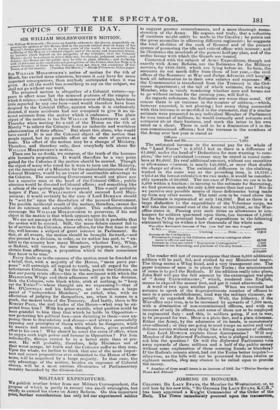TOPICS OF THE DAY.
SIR WILLIAM MOLESWORTH'S MOTION.
I.Sir William Mulessurth—To move an humble address to the Queen, respectfully ex- 'L's g the opinion of this House, that in the present critical state of many of her ,;:itsti,'s foreign possessions in various parts of the world, it is essential to the "raw* of her Majesty's Colonial empire, and of the many and importantdemrs- tie interests which depend on the prosperity of the Colonies, that the, t,oloidal Minister be a person in 0 live dilig,ner, forethought, judgment. Downy, and thattes,,, this !louse and the public may be able to place reliance ; and declaring, with deference to the constitutional prerogatives of the Crown, that her Mnje .ty sa,.0„i., of State for the colonies does out enjoy the con lidenee or this 1170use, or of the country. [Tuesday 6th Mareli.r —Mass of Cummons Notice-paper. SIR WILLIAM MOLESWORTH'S notice of motion for the 6th of March, has excited more attention, because it may have far more important consequences. than anybody anticipated when it was given. As all the world has something to say on the subject, we shall not go without our word. The promised motion is altogether of a Colonial nature—ap- pears to affect none but the misused portions of the empire to which it relates—would, in the common course of things, have been little regarded by any one here—and would therefore have been despised by the Colonial Office, against whom it is exclusively directed, if many accidents had not conspired to give it an in- terest extrinsic from the matter which it embraces. The plain object of the motion is (as Sir WILLIAM MOLESWORTH said on Thursday when moving for a call of the House on the 6th of March) " to relieve the Colonies from an imbecile and worthless administration of their affairs." But about this alone, who would have cared? It is not the Colonial object of the motion that people regard, but its possible effect on the state of parties at home. The effect of the motion may be a change of Ministry. Therefore, and therefore only, does everybody talk about Sir WILLIAM MOLESWORTH'S motion.
There can be no doubt, we suppose, of the truth of the honour- able baronet's proposition. It would therefore be a vast point gained for the Colonies if the motion should be carried. Though the object of many who voted for it were to turn out the Ministry, yet the turning out of a Ministry for the maleadministration of' the Colonial Minister, would be an event of inestimable advantage to the Colonies. The succeeding Government would not place any but a superior man at the head of the Colonial Office ; public attention would be directed to Colonial affairs; anti something like a reform of the system might be expected. This would probably happen if PEEL Or WELLINGTON Should succeed Lord MEL- BOURNE; it would certainly be the case if Lord DURHAM should be "sent for" upon the dissolution of the present Government. The possible incidental result of the motion, therefore, cannot de- feat its intrinsic and ostensible object. This reflection should encourage Sir WILLIAM MOLESWORTH to persevere, if his real object in the motion is that which appears upon its face.
We are not amongst those, however, who think it probable that the motion will be carried. Still, the mere debate cannot fail to he of service to the Colonies, whose affairs, for the first time in our day, will become a subject of great interest in Parliament. So that, at all events, the motion should be brought forward,—and also pressed to a division, in order, as its author has said, to " ex- hibit to the country how many Members, whether Tory, Whig, or Radical, will venture, for mere party purposes, to deny, or abstain from affirming, a proposition which in their conscience they know to be true."
Every doubt as to the success of the motion must be founded on a belief, that, with a majority of the House, "mere party pur- poses" will outweigh all regard to truth, and all regard for the unfortunate Colonies. A fig for the truth, perish the Colonies, so that our party retain office—this is the sentiment with which the MsseouaNs Whigs and their adherents will go to the division. Sink the Colonies, vote black white, stick et nothing, to " keep out the Tories!"—whose thought are we expressing ?—that of Mr. O'CONNELL and his followers, not to mention a large parcel of "independent Members," so called, who, with an affectation of judging for themselves, are, when it comes to a pinch, the merest tools of the Treasury. And lastly, there is Sir ROBERT PEEL, the real leader of the House—what may be ex- pected front him ? With his great wealth, what position could be more grateful to him than that which he holds in Opposition— now protecting his political foes—now dictating to them—now ex- posing them to degradation and shame—and always successfully opposing any principles of theirs with which he disagrees, while he asserts and maintains, and, through them, gives practical effect to his own ? Why should he court the cares of office, when he enjoys such high power and honour in Opposition ? For him individually, 4hings cannot be in a better state than at pre- sent. He will probably, therefore, help Ministers out of their worst scrape, let truth and the Colonies suffer as they may. Upon the whale, we incline to think that one of the most impor- tant and truest propositions ever submitted to the House of Com- mons, will be negatived by a large majority. In that case, the only advantage of the motion, besides on exposure of Colonial abuses, will be a must curious illustration of Parliamentary morality furnished by
the division-list.


























 Previous page
Previous page